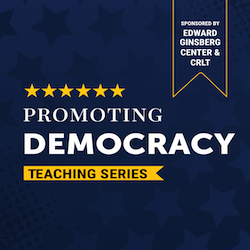As memories of Spring Break fade and we head into the final stretch of winter term, it's a great time to think about student motivation. How effectively are your courses engaging your students and motivating them to learn?

While it can sometimes feel that students simply choose to be engaged or apathetic for their own reasons, the research on motivation clearly indicates that instructor choices significantly affect students' investment in learning. And motivation plays a key role in how effectively students master course material. As Susan Ambrose and her co-authors argue in How Learning Works (Jossey-Bass, 2010), research shows that people are motivated to learn when they:
- See the value, either intrinsic or extrinsic, of learning the particular material or skills, and
- Believe they can succeed.
What teaching strategies do these motivational factors suggest? To help students appreciate the value of the learning goals in your course, you can:
- connect the material to students' lives and interests
- show students the relevance of your course to their other academic pursuits as well as their future professional lives
- share your own enthusiasm and passion about the subject
- assign authentic, real-world tasks (i.e., activities that allow students to demonstrate proficiency or knowledge of course content through addressing an existing challenge or problem) to facilitate and assess their learning
Here are just a few examples of U-M faculty who include such authentic assignments in their courses: In this video from a recent Provost's Seminar on Teaching, Melanie Yergeau of the Department of English discusses her use of a "blog carnival" in her disability studies courses. The Living Music website features musicology professor Mark Clague's students' interviews with contemporary musicians. Electrical engineering professor Ian Hiskens takes students in his Electrical Networks and Markets course on an all-day field trip to a wind farm. Such assignments motivate students to learn by helping them connect their course experiences to technologies, communities, and real lives outside the classroom.
To foster students' expectation of success, it's important to clearly communicate your goals and standards, grade fairly, and provide targeted feedback. Allowing students choice and flexibility in paper topics, deadlines, or class discussion questions can also contribute to their expectations of success by enhancing their sense of control over their learning. Similarly, you can structure in opportunities--such as "exam wrappers"--for students to reflect upon their individual preparation for and performance on an assessment in order to develop concrete plans for future success.
In short, students who clearly understand why it's worthwhile to learn your course material and can track their own progress toward mastery are more likely to end the semester saying, "She was a great teacher! She really motivated me to learn."
If you want to learn more about how to integrate these motivational strategies into your courses, you can request a consultation with a member of the CRLT staff. For additional resources related to student motivation, including lists of concrete strategies to help motivate students to learn, click on this page.
Some content adapted from Ambrose, Susan A., Michael W. Bridges, Michele DiPietro, Marsha Lovett, and Marie K. Norman. (2010). How Learning Works: Seven Research-Based Principles for Smart Teaching. San Francisco: Jossey-Bass.
Note: A version of this post was originally published in March, 2013.
- Log in to post comments
- 119 views






